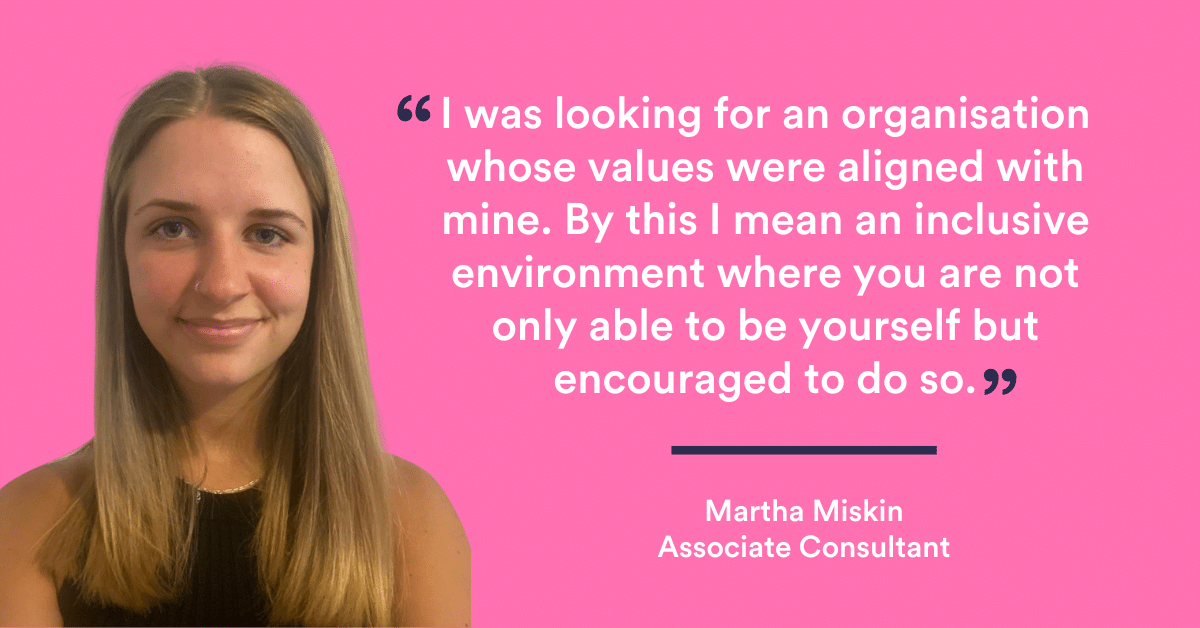Finding Your First Job: Training Schemes vs First Jobs

When searching for your first job – whether you’re fresh out of university or college, embarking on a new career path or getting started after a gap year – deciding what to apply for can be a bit overwhelming, especially when you may see many options while on your job search.
- What is a Graduate scheme or training scheme and how does it differ to other first jobs?
- What benefits do these schemes offer?
- What should you be looking for from a first job?
These are all important questions and ones we will answer in this article.
What is a training scheme?
Training schemes or training academies are entry-level roles aimed at candidates new to the field, the role will involve a structured training programme. The schemes help employers develop the future talent of a business. You may also come across graduate schemes – these are usually offered by bigger companies and require a graduate degree to apply, a training scheme or academy is open to anyone who fits the job description.
What is the benefit of a graduate scheme when looking for a first job?
We spoke to CMA’s HR Business Partner Hayley Murphy, who set up CMA’s own training academy: “There are many benefits to joining a graduate or training scheme when looking for your first role. These schemes are designed to give you the training and development you need to be successful, rather than purely learning on the job, and this is one of the reasons why they are so popular with applicants.”
Training schemes include an array of development opportunities, from classroom-based sessions to coaching and mentoring, giving you a fully rounded experience. Coupled with this, training schemes generally recruit a group of new starters together, giving you a ready-made peer group in your new career.
However, there are also many first jobs which will offer excellent tailored training, so it is vitally important to ask great questions around this during the interview process. Training schemes are also excellent if you are looking to change careers, or if you have some experience in the sector but want to develop further.
- Designed to give you the training and development needed to succeed
- Structured training
- Well-rounded experience with variety of development opportunities
- Often come with a ready-made peer group
Martha Miskin joined us here at CMA recently as part of our CMA Academy. We asked her why she was drawn to a trainee role: “An academy role was perfect for me at this time in my life because I wanted my next role to be my career. Therefore, I needed to ensure that I had the best opportunity of succeeding by getting a proper, well-structured training plan where I can learn the ins and outs, along with ongoing support on the role.”

What should I look for when looking for my first job?
When searching for your first role in your career, there are several key things you will want to look out for when evaluating companies to work for.
First of all, you will want to consider if the company’s values align to your own. Asking questions around inclusion and diversity, and looking for their mission statement to discover core values are ways to uncover this. You will also want to establish more about their work culture – you can learn a lot about both of these things not only from the company website, but also through its social media channels. Asking good questions at the interview will also help to you ascertain if these fit your own ideals.
Another important factor is career development and training – does the company offer a solid training programme and support internal career advancement? A training scheme is a good example of this in practice – however you can also explore development and research their current practices by looking out for promotion announcements on their social media – or ask for more information on this at the interview. In fact, asking about career development opportunities is a great interview question!
We asked Martha what she was looking for from a company when she was on the hunt for a new role: “I was looking for an organisation whose values were aligned with mine. By this I mean an inclusive environment where you are not only able to be yourself but encouraged to do so.
“Another thing that I was looking for was a good work life balance, an understanding and acceptance that it’s important not to over work yourself and ensure you leave time for fun and relaxation!”
Sam Tidman is another new member of our team who joined as part of the academy. He says: “My main focus when looking at a job or a company is realistic and achievable goals, but also the opportunity to gain personal growth and fulfilment.”
Things to ascertain:
- Does the company’s values align to your own?
- What is the work culture like?
- Does the company offer a solid training programme and support internal career advancement?
Should you set a time limit on how long you remain in your first job?
There is a lot of conflicting advice out there on how long you should stay in your first job – and this also varies between industries.
As a recruitment consultancy, we work with candidates who have been in their first job for only a year – and others who have built a long career at one company before seeking something new. Here at CMA we are proud of our own longer-than-average tenure – with several members of our team joining us fresh out of university and whom are still with us 15+ years later.
Leaving too quickly can be a red flag for a hiring manager – there is a rule of thumb that it takes around a year to really get used to a new job. It’s a big adjustment so candidates should aim to stay for a minimum of a year – it demonstrates your commitment and tenacity.
But is there such a thing as staying too long in a job? Does it show you are stuck or will you risk not being hireable by anyone else?
We asked Hayley for her thoughts: “I don’t believe there is a time limit on how long you should stay in your first job. I think that it is important to consider other aspects such as the development you are receiving, the culture of the business and the progression path available as opposed to putting a time limit on your role.”
These factors are far more important to career progression. Hayley concludes: “I believe that it is important to learn the skills of ‘weathering the storm’, which you only gain by spending a period of time in one role.”
So, in summary:
- Leaving too quickly can be a red flag for future roles.
- Staying for 1 year + demonstrates your commitment.
- Consider the development opportunities you are receiving.
- Job culture, progression path and job enjoyment are good reasons to stay put.
How to find your first job
If you need support and guidance in finding your first job then we recommend speaking with a recruitment consultancy that specialises in your chosen industry. They will be able to help you improve your CV and prepare you for interviews, as well as send you jobs that fit your specifications. If you are keen to work in accountancy and finance, HR or practice then CMA can help!
You can also find a whole trove of advice to help you on your job search journey in our Information Hub.

